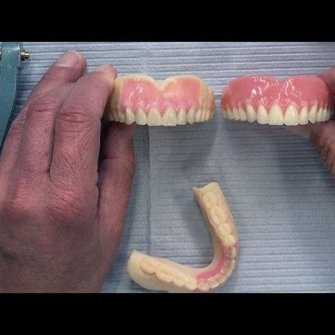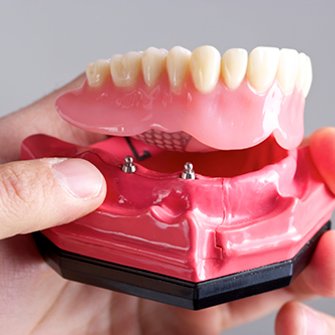
Snap-on Dentures Overview
Snap-on dentures (also sometimes referred to as an overdenture) are a kind of dentures made of acrylic material and generally placed on two to four implants. This implant supported dentures provides a more comfortable use than tradional dentures
Who is this for
- People who has fully missing teeth
- People who are looking for more comfortable acrylic dentures than conventional ones.
- Patients with compromised teeth due to gum disease
Treatment abroad
- Number of trips: 2 visits are required.
- Minimum stay: First visit 2 Days, Second visit 6 days
Treatment process
- Making mould will take average 1 hour.
- Your implant placement will take average 2 hours.
- You will wait 3 months in average for your gums to heal.
- You may require additional time if you need bone grafting.
- Your custom-made dentures will be prepared, in 4 to 6 days. Once ready, dentures will be placed in 1 to 2 hours.
- Short-term: one week for implant site and gums to heal
- Long-term: healing time after implant session takes average 3 months
Snap-on Dentures Cost
Denture Type
Recovery Time
Price
Snap-on Implant Retained Dentures
Per Jaw (2 Implants)
3 Months
€2000
Snap-on Implant Retained Dentures
Per Jaw (4 Implants)
3 Months
€3000
Acrylic Dentures Cost
Denture Type
Price
Removable Dentures
Per Jaw
€350
Snap-on Implant Retained Dentures
Per Jaw (2 Implants)
€2000
Snap-on Implant Retained Dentures
Per Jaw (4 Implants)
€3000
Snap-on Denture Treatment Process
What are snap-on implant retained dentures?
Unlike conventional dentures, which can potentially slip out of place, snap-on implant retained dentures are more stable and versatile.
Dental implants or screws placed within your jawbone hold snap-on implant retained dentures in place. Typically, two to four implants are used in each jaw, although depending on the need and your budget, you may have as many as 10 inserted.
Once the implants are in your jaw, an implant-retained or implant-supported denture (also sometimes referred to as an overdenture) can be set in place.
Snap-on dentures treatment process
- Initial consultation and X-Ray or CT scan. The dentist will assess the overall condition of your mouth and jaw and take a CT scan. If you decide that All-on-4 is right for you, the dentist will take impressions of your mouth. These will then be sent to the lab for the creation of customised prostheses - the jaw and tooth sections or bridges that will be attached to the implants.
- Anaesthesia and extraction (if needed). When you attend the surgery to have your implants fitted, the dentist will give you an anaesthetic so that the entire process is painless. If teeth need to be extracted, this can normally be done at the same time. Your mouth is then thoroughly cleaned to remove bacteria and damaged tissue.
- Making the mould. Once the teeth have been prepared, the dentist will then make a mould in order to construct the veneers that specially fit your teeth. The mould will then be sent to the laboratory. The lab will use the mould to produce exact replicas of the damaged teeth.
- Placing the implants. (Only for snap-on implant retained dentures) The surgery time depends on the number of implants needed and the overall health of the patient's mouth. The procedure occurs under local anesthesia and is the same regardless of how many implants are necessary.
- Placing the dentures. The denture is placed into the jawbone and the gums are stitched closed over the implant.
Why choose acrylic dentures?
Benefits:
- Snap-on implant retained dentures are more stable and comfortable than conventional dentures, which are made to be removable daily.
- They are less likely to become loose while speaking than removable dentures.
- Unlike conventional dentures, which can potentially slip out of place, snap-on implant retained dentures are more stable and versatile than conventional dentures.
- Many people consider snap-on implant retained dentures to be more natural looking than conventional dentures.
- The jawbone is preserved and further bone loss is prevented with snap-in dentures.
Drawbacks:
- Less durable and will need to be replaced every 5-8 years.
- A full palate base is needed for upper set dentures which can cause gagging and affect the taste and experience of food.
- Are usually bulkier than Full-arch dental implants and All-on-4 implants and can therefore sometimes be less comfortable.
SNAP-ON DENTURES GALLERY
Snap-on dentures process images
Aftercare
Snap-on Dentures Aftercare
- Swelling can be managed by applying ice packs to the surgical site.
- This needs to be done continuously for at least the first 36 hours.
- Bleeding is common after an endosseous implant aka dental implant procedure.
- If it is in excess, you can place a sterile gauze piece in between your teeth for about 30 minutes.
- If the bleeding doesn't stop, you will have to consult your doctor.
- Aftercare pain medication and antibiotics need to be taken as per your doctor's after care instructions.
- Keep all physical activity including strenuous exercise to a minimum, as this can increase bleeding.
- Using the dentures can lead to application of pressure on the new implants, before they have completely healed.
Snap-on Dentures FAQ
What are the materials used in snap-on dentures?
Modern prostheses are made from technologically advanced materials. The base is acrylic, designed in the same color as your gums.
Can you eat with snap-on dentures?
Once you are fully adjusted to wearing dentures, you should be able to eat almost anything. However, there may be some foods that will always be difficult to eat such as foods that are hard, sticky or contain small hard particles.
How do I clean my snap-on dentures?
Dentures need gentle, daily care just like your teeth do. Acrylic dentures are porous and prone to absorbing stains over time. Scrub them with a soft toothbrush using special toothpaste and water.
How long will my snap-on dentures last?
Snap-on dentures made of acrylic resin need replacement every five to eight years. As you age, your dentures may need to be realignedwith the changing shape of your mouth. Rebasing dentures involves remaking the base of the denture, keeping the existing denture teeth intact.
Potential risks and side effects
- Infection
Alternative treatments
Plan your treatment and get a quote online.
30 minutes free online video and phone consultation. Schedule your virtual visit.









